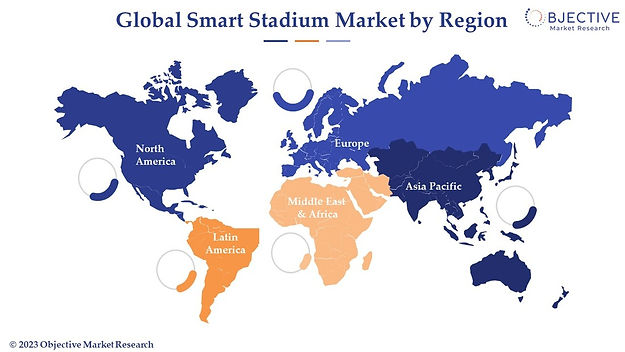Smart Stadium Market Insights: The Key to Unlocking Market Dynamics and Opportunities
Category - ICT
Report Code - OMR-ICT-258
Format: PDF, PPT, and Excel
Smart Stadium Market to Present Towering Growth at 21.0% CAGR During Forecast, Factors such as Rising Interest in Thrilling Sporting Events to Present Demand
Stadium managers confront a difficult squeeze play as spectators demand a more thrilling experience and host communities seek greater returns on their sports complexes' investments. More than ever before, stadiums must develop innovative strategies to attract more viewers, increase revenue from existing customers, and ensure the protection of everyone inside.
Most divisions and competitions have been suspended due to the recent coronavirus outbreak. As a result, conference organizers may experience a decline in revenue due to postponed or rescheduled events. In March 2020, a global epidemic halted all conventional sports championships, while Twitch's gaming streaming platform saw its user base increase by 31%. Consequently, despite the loss of many thousands of live events, Esports continues to triumph. Consequently, the smart stadium industry is anticipated to expand slower during the pandemic.
Key Takeaways of the Smart Stadium Market
By Component
In 2022, the smart stadium industry's software subsegment generated the most revenue. Everyone who attends or works in a stadium benefits from the transition to digital. Using technology for managing to park, selling tickets, renovating seats, and directing crowds are some potential applications of the smart stadium concept.
By Deployment
In terms of revenue, the power source on-premises category dominated in 2022. Modern stadiums' "smart" infrastructure consists of numerous sensors, cameras, and touchscreens connected to various networks and computers. It assists security officers in monitoring crowd behavior by providing real-time data.
By Region
The market for intelligent stadiums is anticipated to be the largest in Europe. According to Worldstadiums.com, there are 1,335 stadiums in the region. This region contains the maximum number of prominent sports organizations and clubs.

Post-Epidemic, Increasing Number of Sports Events Will Drive Exceptional Market Demand
Due to the rising trend of consumers preferring to receive game notifications and statistics on their smartphones or tablets, stadiums are seeking innovative ways to generate revenue, attract larger crowds, and encourage fans to spend more. Fans within the stadium can broadcast the game from a distance and share their emotions on social media.
As an increasing number of fans desire to attend their favored events in person, stadium sponsors are assisting by reducing the cost of abroad travel and offering attractive ticket prices. As an illustration, Germans adore sports, particularly football and the Bundesliga, or German Bundesliga League, which consistently attracts sold-out audiences to the nation's stadiums. This goes well to the market as a whole and should result in increased stadium attendance in the coming years.
Smart Solutions to Accommodate Wider Market Growth
During the forecast time frame, the demand for intelligent stadium technologies is anticipated to increase for various reasons, including the increasing use of the Internet of Things, or IoT, methods for the effective operation of stadium infrastructure, and a greater emphasis on fan engagement and satisfaction at the venue. The worldwide sports governing bodies have imposed several security regulations on stadium construction.
More energy consumption results in increased energy loss and carbon dioxide emissions. Therefore, it is essential to use power efficiently. Almost a quarter of all released greenhouse gases result from electricity generation. In response to rising concerns about climate change and ozone depletion, governments in both affluent and developing nations are working hard than ever to lower their carbon footprints. As governments take action, more stringent emission regulations are implemented.
Global Smart Stadium Market Prominent Players
• Cisco (US)
• GP Smart Stadium (Netherlands)
• BM (US)
• Tech Mahindra (India)
• NEC (Japan)
• Cisco (US)
• Huawei (China)
• Intel (US)
• Fujitsu (Japan)
• Johnson Controls (Ireland)
• NTT (Japan)
• Ericsson (Sweden)
Report Scope for Smart Stadium Market
Component
• Software
o Stadium and Public Security
o Automation
o Event Management
o Network Management
o Others
• Services
Service
• Consulting
• Deployment & Integration
• Support & Maintenance
Deployment
• On-Premise
• Cloud
• Hybrid
Smart Stadium Market Regional Segmentation
North America
o U.S.
o Canada
o Mexico
Europe
o Germany
o U.K.
o France
o Spain
o Italy
o Rest of Europe (RoE)
Asia Pacific (APAC)
o Japan
o China
o India
o South Korea
o Rest of APAC
Latin America
o Argentina
o Brazil
o Rest of Latin America
Middle East & Africa
o South Africa
o UAE
o Saudi Arabia
o Rest of MEA
*Our reports are available on a region/wise and chapter/wise basis as well. For any additional personalization contact our sales representative directly at sales@objectivemarketresearch.com